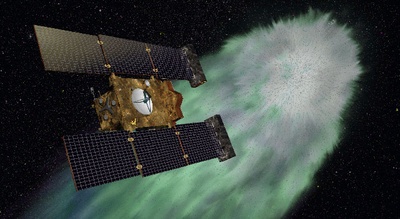Stardust Celebrates Twelve Years With Rocket Burn
The half-minute trajectory correction maneuver, which adjusts the spacecraft's flight path, began at about 1 p.m. PST (4 p.m. EST) on Monday, Feb. 7. The 30-second-long firing of the spacecraft's rockets consumed about 69 grams (2.4 ounces) of fuel and changed the spacecraft's speed by 0.56 meters per second (1.3 mph).
NASA's plan for the Stardust-NExT mission is to fly the spacecraft to a point in space about 200 kilometers (124 miles) from comet Tempel 1 at the time of its closest approach. During the encounter, the spacecraft will take images of the surface of comet Tempel 1 to observe what changes have occurred since a NASA spacecraft last visited. (NASA's Deep Impact flew by Tempel 1 in July 2005).
Along with the high-resolution images of the comet's surface, Stardust-NExT will also measure the composition, size distribution and flux of dust emitted into the coma, and provide important new information about how comets evolve.
Stardust was launched on Feb. 7, 1999. This current Stardust-NExT target is a bonus mission for the comet chaser, which flew past comet Wild 2 in 2004 and returned particles from its coma to Earth.
While its sample return capsule parachuted to Earth in January 2006, mission controllers were placing the still-viable spacecraft on a path that would allow NASA the opportunity to re-use the already-proven flight system if a target of opportunity presented itself. In January 2007, NASA re-christened the mission "Stardust-NExT" (New Exploration of Tempel), and the Stardust team began a four-and-a-half year journey for the spacecraft to comet Tempel 1. The spacecraft has traveled more than 3.5 billion miles since launch.
